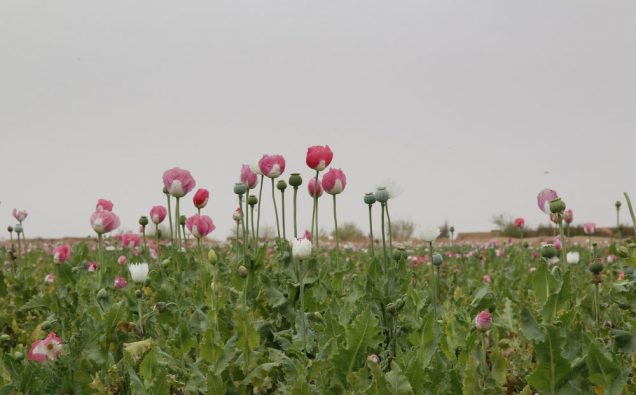
Opium poppy field in Afghanistan. Photo: IRIN/UN
The United Nations is ringing alarm bells that the production of opium in Afghanistan – a major source of the Taliban insurgency – has seen an 87 per cent production jump compared to 2016 with international implications from drug abuse to insecurity.
Afghan Ministry of Counter Narcotics and the United Nations Office on Drug and Crime reported the new figures in the Afghanistan Opium Survey 2017, as the landlocked country reels from militancy in the ungoverned areas.
“It is high time for the international community and Afghanistan to reprioritize drug control, and to acknowledge that every nation has a shared responsibility for this global problem,” said UNODC Executive Director Yury Fedotov.
Besides an 87 pecent expansion in the production of the crop to a record level of 9,000 metric tonnes in 2017, the area under opium poppy cultivation also increased to a record 328,000 hectares in 2017, up 63 per cent compared with 201,000 hectares in 2016.
“For both Afghanistan, and the world, we are heading towards uncharted territoryAdditionally, the number of poppy-free provinces in the country decreased from 13 to 10 – and after more than a decade, Ghazni, Samangan and Nuristan lost their poppy-free status. The number of provinces affected by cultivation increased accordingly from 21 to 24.

“These frightening figures should give considerable pause for reflection on whether the calculus on the illicit drugs flowing from Afghanistan adds up to a workable and achievable solution,” he said.
Fedotov notes that Afghanistan, which is “already suffering from the opium produced within its borders, the increases will drive drug abuse, an increased dependency on the illicit economy, and rising levels of corruption.”
The opium production would not only hurt Afghanistan but the entire region.
Gains on governance and transparency in Afghanistan and surrounding countries will also be challenged by more instability, insecurity, and increased funding to terrorist groups, the United Nations said.
“New actors and markets are likely to emerge; some of these new actors may be terrorist groups attempting to use the drug trade to finance their global operations,” Fedotov warned.
Far greater amounts of opium in the world’s consumer markets would increase health and social problems – also placing added burdens on already stretched Afghan public health services.

















